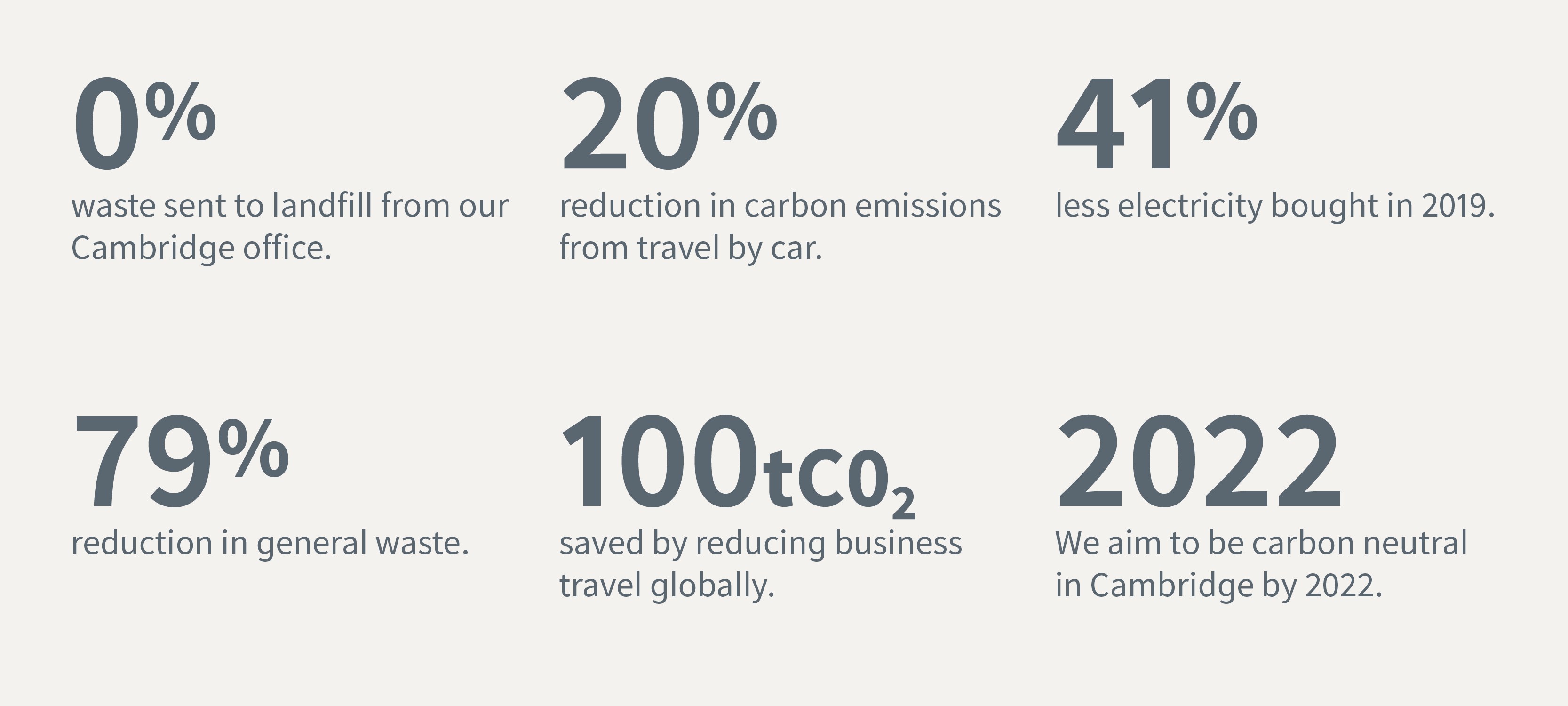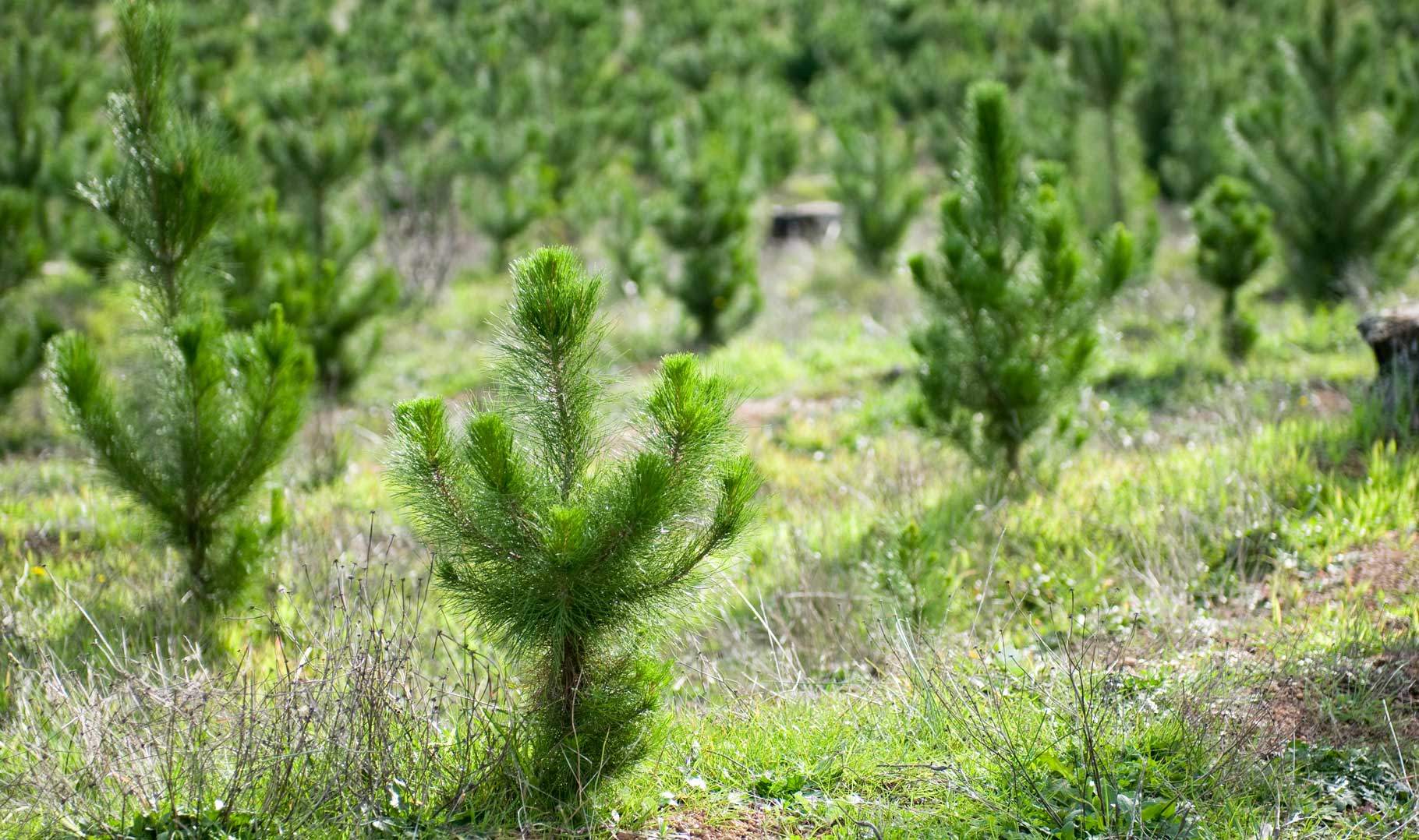We are committed to reducing our energy-related emissions to zero carbon globally by 2048, with a 70% reduction by 2030.
We recognise that there is a climate emergency, and we believe that we have a responsibility to address it. We play a global role in education and research, with our publishing helping to inform and shape the debate around some of the world’s most pressing challenges.
“We are keenly aware that, as a global publisher of education and research, we help to inform and shape debate around climate change and sustainability. That, really, has been the impetus behind our goal to make the Press a carbon neutral business, and it’s a goal that our colleagues have wholeheartedly embraced.”
Helen Griggs, Global Director for Environment, Procurement and Supply
From removing plastic cutlery in our canteens to planting a sedum roof, this is a journey made up of multiple initiatives looking at every aspect of what we do. Small details, and engineering feats, they all add up. Some of the highlights so far include: installing one of the UK’s largest solar roof installations, removing plastic from our staff restaurants, and being awarded the highest rating of 3 Trees from the World Wildlife Fund for sustainable timber procurement.
Our commitment to the environment
We share our ambitions with Cambridge Assessment. Read more about their sustainability work.
Environmental initiatives

With our focus on on climate change and sustainability in our publishing, we naturally decided to set science-based targets. “This means looking at all the data and being honest about the figures, even though some will be hard to find and harder to change”, says Helen Griggs.
We are measuring ourselves against the three scopes of the Greenhouse Gas Protocol. Scope 1 covers direct emissions from activities under our control, such as our offices. Scope 2 is indirect emissions from the electricity we buy. On these two we are on track for a 70 per cent global reduction in carbon emissions by 2030, with zero by 2048, but aiming for 2038, in line with the University of Cambridge.
Scope 3 is harder because it covers emissions from third parties and beyond our immediate control, such as procurement and distribution. But we have set our sights on being carbon zero globally by 2048.
What’s happened so far in Cambridge?
- In 2017–18 we planted a sedum roof on the University Printing House to filter CO2 and pollutants and encourage biodiversity
- In 2019 we installed one of the UK’s largest flat roof solar installations. This reduces our carbon footprint in the UK by 20 per cent, and will be able to meet up to five per cent of our power needs. This and other initiatives mean that all our electricity now comes from renewable sources.
- We have switched to waste contractors who do not use landfill sites; waste is instead processed using recycling, incinerating and anaerobic digestion methods
- Plastic food packaging and cutlery has been removed from our on-site restaurants, and staff fill up their own cups from our water coolers
- We are reducing the number of fleet cars and average miles travelled, and have added more electric car charging points. We now have a car sharing scheme and a bicycle pool
- Cardboard binders have replaced plastic, and we use pens made from recycled bottles
- In 2020 we won the Independent Publishers’ Guild Sustainability Award
This is just the start. We operate in more than 50 countries and are working with colleagues worldwide to cut their carbon footprints too. Six working groups of colleagues from around the business are looking at travel, energy, food, product and paper, resources and waste, and freight and supply chain. Their passion is helping to drive this journey forward.
IPG Sustainability Award winners 2020
In 2020 we won the Independent Publishers’ Guild Sustainability Award, which recognised the concrete actions we have taken to make our operations more sustainable, the powerful combination of our publishing on climate change and sustainability, and the energy and enthusiasm of our colleagues.

Cambridge Zero

“Climate change is a challenge that affects us all and by highlighting the work everyone, as individuals and as part of a community, is doing to address it – no matter how small or big the contribution – it all adds up.”
Dr Antoinette Nestor, Engagement Manager of Cambridge Zero
Cambridge Zero is a bold new climate change initiative from the University of Cambridge, which has committed to harnessing its research and policy expertise to accelerate progress towards a zero-carbon world.
Together we hosted the first Cambridge Zero Climate Festival in November 2020, bringing together expert presentations and panels to share exciting research and initiatives that are really making a difference. The free virtual event took place on our Cambridge Open Engage platform.
Cambridge University Press will continue to be a key partner to Cambridge Zero as their work continues.
Sustainable procurement

As a publisher reliant on sourcing paper and board we have a moral obligation to use only legal and sustainable sources, which is tough as it’s not in our direct control. But we can use our international buying power to encourage suppliers to review their own practices. And we evaluate their environmental credentials as part of our tendering process.
To help us, we work with the Forest Stewardship Council (FSC), Programme for the Endorsement of Forest Certification (PEFC) and Convention on International Trade in Endangered Species of World Fauna and Flora (CITES).
75 per cent of books and journals only contain paper and board that is either FSC or PEFC certified. For the remaining 25 per cent, we only buy paper and board from sources rated by the Publisher’s Database for Responsible Environmental Paper Sourcing (PREPS).
In 2019 we gained the top Timber Scorecard rating from World Wildlife Fund, a prestigious 3 Trees Award recognising our work to ensure sustainable timber sourcing.
“We went from a 0 Tree score in 2015 to 3 Trees in 2019. It’s fantastic for all the colleagues and suppliers involved to see their effort acknowledged.” Helen Griggs, Global Director for Environment, Procurement and Supply
View our Sustainable Procurement Policy (PDF)
Our publishing

Many of our authors are at the forefront of climate science, and our publishing ranges from scientific research through to general books from some of the world’s highest profile climate activists.
Some of our key environmental titles include:
The Citizen’s Guide to Climate Success: Overcoming Myths that Hinder Progress, by Mark Jaccard.
Named one of the best books of 2020 for environment in the Financial Times.
There is No Planet B, Mike Berners-Lee
‘Mike doesn’t preach, instead he shares his insights with warmth and wit, and his book could not be more timely.’ David Shukman, BBC Science Editor
Global sustainability
An Open Access journal dedicated to supporting the rapidly expanding area of global sustainability research. It publishes interdisciplinary research, reviews and commentaries that explore human social and economic pressure on the Earth and solutions that will allow us to transform our societies and to live and develop sustainably.
Read a free sample of our climate change and environment content
Please click the link below to read some of our sample content relating to climate change and the environment.
You can view a full list of our environment publishing on Cambridge Core.






